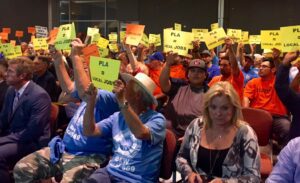Measure To Safeguard State Infrastructure Funding For San Diego Earns Approval From City Council Committee
SAN DIEGO – The San Diego City Council Rules Committee today advanced a ballot measure for November’s election aimed at safeguarding state infrastructure funding during the current economic crisis.
The measure, named Safeguard San Diego by its proponents, would update outdated city contracting rules that puts San Diego at risk of losing millions in state funding and restores the city’s ability to use project labor agreements for priority local hiring.
Tom Lemmon, Business Manager of the San Diego Building & Construction Trades Council, applauded the Rules Committee’s vote, saying: “As San Diego struggles to recover from this economic crisis, we can’t afford to lose millions in state funding for essential neighborhood infrastructure and local jobs. Updating these outdated contracting rules that threaten San Diego’s ability to recover and rebuild from COVID-19 is the right move.”
Tom Lemmon continued: “As we move forward with this measure, it’s also critical to us to achieve equity for Black, Brown and women-owned businesses and workers who have been excluded from city contracting for too long. The strong anti-discrimination protections in this measure are a good first step, but more work will be done to deliver equity, opportunity and community investments where they’re needed most.”
The Rules Committee approved the measure and forwarded it to the full City Council in a 3-2 vote, with Councilmembers Georgette Gómez, Chris Ward and Monica Montgomery in support.
In addition to aligning city contracting policies with state funding requirements, the measure prohibits discrimination on city public works contracts, expands public disclosure of bids and awards, and establishes the city’s first-ever Citizen’s Construction Project Oversight Board to guard against fraud, waste and abuse on city infrastructure projects.
A broad coalition led by the San Diego Building Trades Council, which represents over 30,000 construction trades workers in San Diego, proposed the measure to the City Council in May, counting among its initial supporters the Middle Class Taxpayers Association, Congressman Scott Peters, County Supervisor Nathan Fletcher, and Southeast San Diego community groups, Pillars of the Community and Homework.
Jason Stanton-Milsap of Homework, a community organization that connects formerly incarcerated San Diegans with job training opportunities in the building trades, said: “Working class San Diegans are weathering a storm of crises and this simple fix would make a big difference at a time when every dollar for jobs and communities really counts. Without action to protect state funding for local infrastructure projects we risk losing investment our communities desperately need and job training opportunities that are a lifeline to so many, especially our formerly incarcerated community members.”
Dozens of community leaders and residents attended the committee hearing remotely and submitted comments in support of the measure. Speakers expressed the urgency of preserving San Diego’s fair share of state funding in the wake of the economic fallout from the COVID-19 pandemic, including 30% unemployment in San Diego.
In a letter introducing the ballot measure proposal to the City Council, the coalition pointed to the significant state funds that would be at risk if the city did not update its contracting rules: “In 2019, San Diego received over $64 million in state funds to fix streets, upgrade parks and rebuild neighborhood infrastructure. For San Diego’s Pure Water project alone, the loss of state funds would cost city taxpayers $140 million. All of that is at risk if the city does not act.”
Project Labor Agreements govern the terms and conditions for employment on a construction project. Supporters of PLAs say they can lead to better wages for workers, local hiring requirements and expanded career training opportunities through apprenticeships. PLAs also protect taxpayers by eliminating costly delays due to labor conflicts or worker shortages.
In the March primary, Chula Vista voters approved a similar initiative, Measure E, with an overwhelming 67% of the vote.
The City of San Diego measure will next be considered by the full City Council, and with their approval, San Diego voters will make the final call in November.
Click here to sign up for updates from our campaign, Safeguard San Diego!

